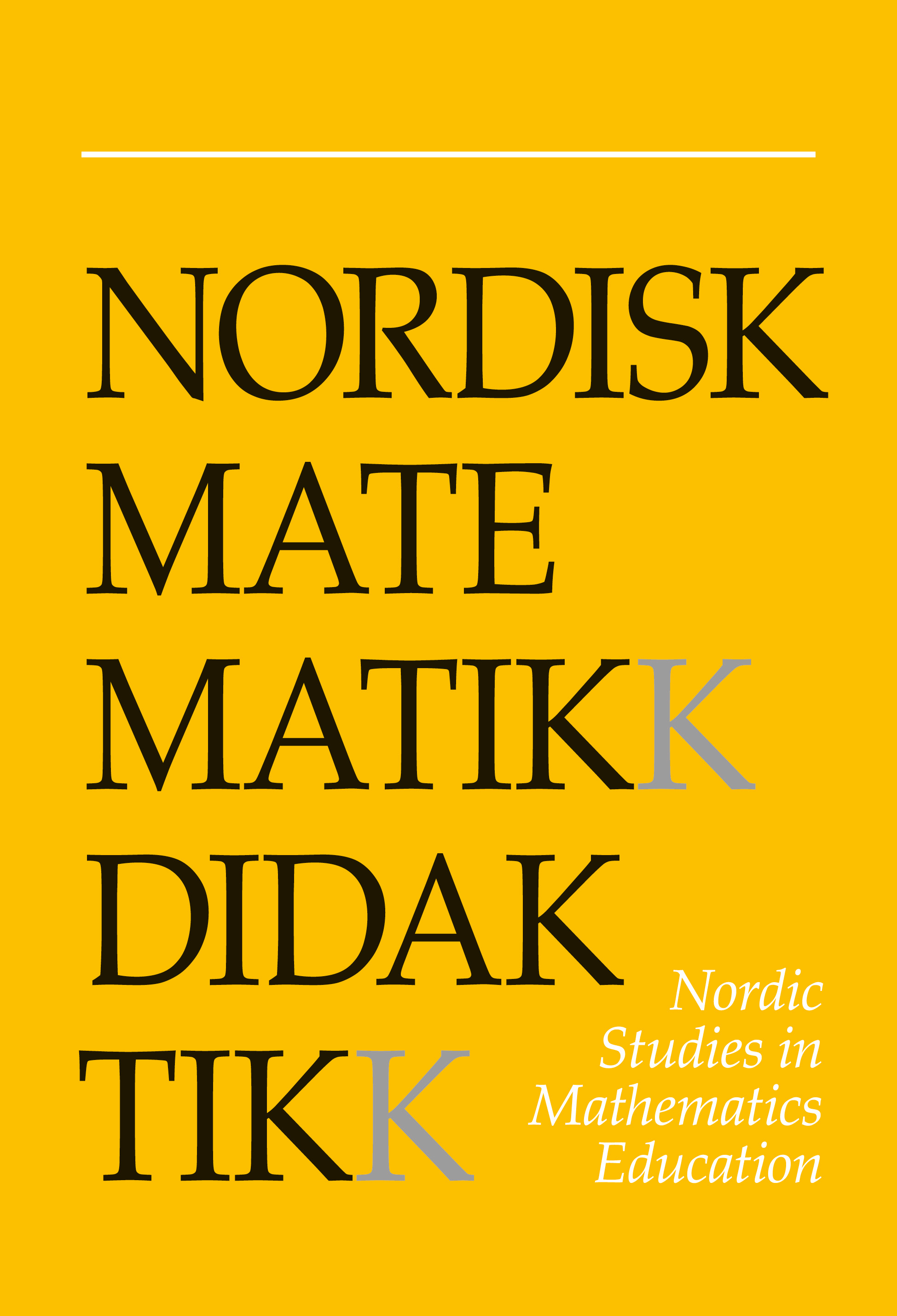To translate between different perspectives in belief research: a comparison between two studies
DOI:
https://doi.org/10.7146/nomad.v16i1-2.148391Abstract
A common problem in belief research seems to be a missing link between aspects of theory and empirical analyses and results. This issue highlights a question of how dependent empirical studies about beliefs actually are on the theoretical perspective described in the study. In this paper, I examine relationships between two different perspectives. One perspective focuses on belief change, and seems to rely on a type of cognitive perspective, where beliefs can be characterized as mental objects. The other perspective argues for moving away from such cognitive perspective and instead to adopt a participatory perspective in the analysis of mathematics teaching. The results show that the study about belief change is not dependent on seeing beliefs as mental objects, but that this study could as well have been located within a participatory perspective.
References
Bergsten, C. (2008). On the influence of theory on research in mathematics education: the case of teaching and learning limits of functions. ZDM - the International Journal on Mathematics Education, 40, 189-199. https://doi.org/10.1007/s11858-008-0083-2
Even, R. & Schwarz, B. B. (2003). Implications of competing interpretations of practice for research and theory in mathematics education. Educational Studies in Mathematics, 54, 283-313. https://doi.org/10.1023/B:EDUC.0000006166.50134.7a
Furinghetti, F. & Pehkonen, E. (2002). Rethinking characterizations of beliefs. In G. C. Leder, E. Pehkonen & G. Törner (Eds.), Beliefs: a hidden variable in mathematics education? (pp. 39-57). Dordrecht: Kluwer Academic Publishers. https://doi.org/10.1007/0-306-47958-3_3
Gellert, U. (2008). Validity and relevance: comparing and combining two sociological perspectives on mathematics classroom practice. ZDM - The International Journal on Mathematics Education, 40, 215-225. https://doi.org/10.1007/s11858-008-0074-3
Leder, G. C. (2007). Beliefs: What lies behind the mirror? In B. Sriraman (Ed.), Beliefs and mathematics: Festschrift in honor of Günter Törner's 60th birthday (pp. 39-50). Charlotte: Information age publishing. Retrieved September 6, 2010 from www.math.umt.edu/tmme/Monograph3/Leder_Monograph3_ pp.39_50.pdf
Niss, M. (2007). The concept and role of theory in mathematics education. In C. Bergsten, B. Grevholm, H. Måsøval & F. Rønning (Eds.), Relating practice and research in mathematics education: Proceedings of Norma 05, Fourth Nordic Conference on Mathematics Education (pp. 97-110). Trondheim: Tapir Academic Press. Retrieved October 15, 2010 from www.alt.hist.no/~froder/norme/index-filer/NORMA05.pdf
Pajares, M. F. (1992). Teachers' beliefs and educational research: cleaning up a messy construct. Review of Educational Research, 62 (3), 307-332. https://doi.org/10.3102/00346543062003307
Philipp, R. A. (2007). Mathematics teachers' beliefs and affect. In F. K. Lester (Ed.), Second handbook of research on mathematics teaching and learning (Vol. 1, pp. 257-315). Charlotte: Information Age Publishing.
Pintrich, P. R. (2002). Future challenges and directions for theory and research of personal epistemology. In B. K. Hofer & P. R. Pintrich (Eds.), Personal epistemology: the psychology of beliefs about knowledge and knowing (pp. 389- 414). Mahwah: Lawrence Erlbaum Associates.
Radford, L. (2008). Connecting theories in mathematics education: challenges and possibilities. ZDM - The International Journal on Mathematics Education, 40, 317-327. https://doi.org/10.1007/s11858-008-0090-3
Skott, J. (2010). Shifting the direction of belief research: from beliefs to patterns of participation. In M. M. F. Pinto & T. F. Kawasaki (Eds.), Proceedings of the 34th Conference of the International Group for the Psychology of Mathematics Education (Vol. 4, pp. 193-200). Belo Horizonte: PME.
Speer, N. M. (2005). Issues of method and theory in the study of mathematics teachers' professed and attributed beliefs. Educational Studies in Mathematics, 58, 361-391. https://doi.org/10.1007/s10649-005-2745-0
Österholm, M. (2009). Theories of epistemological beliefs and communication: a unifying attempt. In M. Tzekaki, M. Kaldrimidou & C. Sakonidis (Eds.), Proceedings of the 33rd Conference of the International Group for the Psychology of Mathematics Education (Vol. 4, pp. 275-264). Thessaloniki: PME. Retrieved December 14, 2010 from urn.kb.se/resolve?urn=urn:nbn:se:umu:diva-24976
Österholm, M. (submitted). The role of theory when studying epistemological characterizations of mathematics lecture(r)s.
Downloads
Published
How to Cite
Issue
Section
License

This work is licensed under a Creative Commons Attribution-NonCommercial-ShareAlike 4.0 International License.



